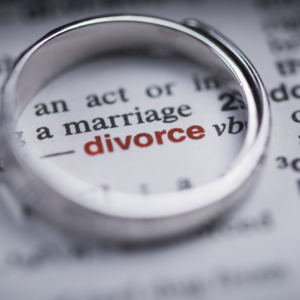When it comes to divorce, people often have many different questions. Divorce is a complex process, involving several different topics and it will vary depending on your unique situation. While we recommend speaking to a divorce attorney about your case, we have compiled a list of some of the most frequently asked questions about divorce in Virginia and their answers!
Is sexting considered adultery in Virginia?
Generally, no. Adultery, as defined by Virginia law, necessitates actual sexual interaction between individuals. Even kissing, handholding, and the like would not be “adultery.” That said, “sexting” and other similar behaviors, or even more subjective behaviors that merely overstep the boundaries of your relationship, can be considered negative contributions to the marriage or factors causing the breakdown of the marriage. In some circumstances, those behaviors might impact a marriage or divorce as much as or more than true adultery.
Who pays for a divorce due to adultery in Virginia?
There is no rule that a party committing adultery is automatically on the hook for the innocent spouse’s divorce expenses or has to pay them any more in property or support. It would be one of many factors, positive and negative, for a court to consider in determining if one party should contribute to the other’s attorney fees.
What is Virginia’s law about adultery during separation?
Adultery during a separation period is still adultery under Virginia law. What impact it might have on the outcome of a divorce that is already underway is a case-by-case consideration that you need an experienced attorney to particularize for your circumstances.
What is a spouse entitled to in a divorce settlement in Virginia?
There are no rights in Virginia divorce and family law that are any more or less available to either spouse based upon their gender. Both parties may seek, and either may receive, a divorce on fault or no-fault grounds, legal and/or physical custody of children, division of marital property, temporary and/or indefinite (“permanent”) spousal support from the other spouse, child support from the other spouse, and/or an award of attorney fees and other litigation expenses paid by the other spouse.
How long can your spouse drag out a divorce in Virginia?
Like most everything else in a Virginia divorce, the answer is “it depends.” In some cases, a spouse trying to protract a case interminably will be largely unable to do so, but in some cases, they might be frighteningly able to do so.
The factors that can play into the timeline of your divorce can include, but are not necessarily limited to:
(1) the jurisdiction in which your divorce is filed;
(2) the court’s trial date calendar;
(3) attorneys’ calendars;
(4) what your contested issues are;
(5) whether or not you have children;
(6) whether there are complex issues such as business interests, international property/custody, psychological evaluations, etc., or
(7) extenuating circumstances that arise during the pendency of the divorce.
Does it matter who files for divorce first in Virginia?
Almost never. It does not matter one bit to the outcome of a divorce, whether by settlement or by a court ruling, who is the plaintiff (initial filing spouse) and who is the defendant (initial receiving/responding spouse). Often, the initial defendant will file their own counter-claim for divorce, so both spouses are filing parties. That said, sometimes one spouse has a fault ground for which they can file (e.g., adultery) and the other does not, meaning that counter-claim cannot be filed until the spouses have been separated for one year.
What documents do I need to file for divorce?
Technically, all you will legally need to file for a divorce is a Complaint for Divorce and a court’s filing fee. You do not make out your factual case when filing, even if your Complaint for Divorce includes allegations of fact concerning your marriage and the reasons or grounds for divorce.
That said, when filing for divorce, it would be sensible for you to have gathered up as much of the evidence that you will want to have when the time comes to settle your divorce or go before a judge. Depending on your issues, these documents might include tax returns and other income information, property-related documents (deeds, HUD-1s, mortgage statements, bank/retirement/investment statements, jewelry appraisals), documents related to any children (school attendance records, medical records), or anything else that might be relevant to what you are asking a court to do for you – or asking that it not do for your spouse.
Does my spouse have to be with me to file for divorce? Do both parties have to agree to a divorce in Virginia?
No and no. Either spouse is absolutely entitled to seek a divorce, absent the consent of the other party, provided that they meet the jurisdictional and other legal requirements to do so. Consent of the other spouse can make the process more expeditious in some circumstances, particularly where there are no minor children involved, but lack of consent cannot bar a person from pursuing a divorce.
What is the difference between contested and uncontested divorce?
An uncontested divorce is a divorce that is agreed to by both parties, with a signed agreement resolving their marital issues (custody/visitation, property division, spousal and/or child support, and peripheral matters), that would not have to involve a decision by a judge or an arbitrator. By contrast, a contested divorce is any divorce where there are any marital issues left to be decided by a judge, even if some issues have been resolved by agreement. For example, spouses might agree on child custody but not whether one spouse is at fault for adultery and whether one is entitled to spousal support, and so that would remain a partially contested divorce because not everything has been agreed to.
What are the grounds for divorce in Virginia?

Virginia has two paths for divorce: no-fault divorce and fault-based divorce.
No-fault divorce requires only that you and your spouse have been separated and not “cohabiting” as spouses for a period in excess of one year before either of you can file with a court to commence a divorce action. If you have a settlement agreement and no children, then that one year is shortened to six months.
Where a spouse has a fault ground for divorce, typically that permits immediate filing by that spouse, but the court still will not be able actually grant the divorce for some time. The most common fault grounds are:
- Adultery (see above).
- Desertion, which involves abandoning the marriage for no valid reason or for a bad reason. Not every separation can be desertion, otherwise every marital breakup would be.
- Cruelty by the other spouse, which usually necessitates actual physical violence on their behalf, but as always, there are exceptions.
- Constructive Desertion, which is largely another way to characterize cruelty: the other spouse’s behavior was so odious and unacceptable that you had to leave the marriage.
All of these grounds can be highly fact-specific, so speaking to a lawyer about your particular circumstances is highly recommended.
Do I need to file for legal separation?
No. Separation is not a filing status, but rather how the spouses conduct themselves relative to each other, including formation of the intent that the relationship is over and will lead to a divorce.
Spouses who are separated can live under the same roof, but many of the trappings of a “conventional” marriage are not being observed, including the following:
- Not having sexual relations
- Not sleeping in the same bed/bedroom
- Not doing each other’s laundry
- Not cooking for or taking meals with each other
- Not going out, watching movies together, engaging in recreational activities
- Not going to social events together
- Not presenting as an intact couple at public events (e.g., parent-teacher nights)
- Telling important people in your lives that you are separated/divorcing
- Not keeping your finances fully integrated (although not necessarily completely separated)
Do I need a lawyer if my divorce is uncontested?
Technically, you do not need a lawyer for a divorce, whether contested or uncontested. In a contested divorce that requires court appearances, it can be hugely important to have a lawyer navigate the law and procedure; without a lawyer, you will be held to the same standard as a person with a lawyer, and if your spouse has one and you don’t, you could be at a tremendous strategic disadvantage.
Even an uncontested divorce is going to require agreements and court documents to be prepared and submitted, some of which may have some technical requirements. Even if you and your spouse appear to be agreed on everything and plan to sign a settlement agreement, you will want a lawyer to at least review that document and ensure that you are getting (or giving up) what you think you are.
To speak to an attorney at our office about divorce, please call Cook Craig & Francuzenko PLLC today.


